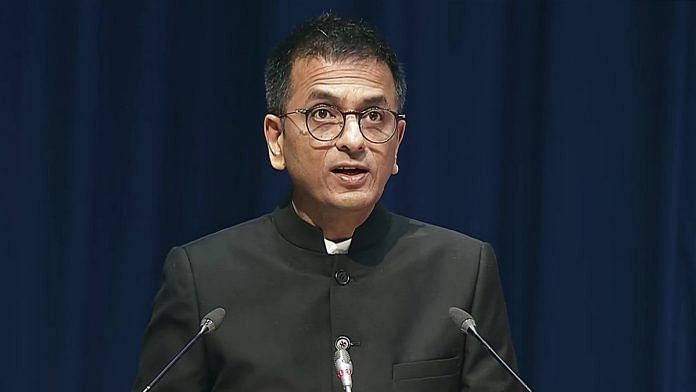New Delhi: While delivering the keynote address at the inaugural session of the National Stakeholders Consultation on POCSO Act 2012 Saturday, Chief Justice of India D.Y. Chandrachud emphasised the need for child-friendly courts and the use of technology to put children more at ease while testifying.
He said that 2022 marks the tenth anniversary of POCSO (Protection Of Children from Sexual Offences Act) making it an opportune time to take stock of its implementation.
During the address, he touched upon the hesitance amongst family members to file reports, the stigma and stereotypes surrounding cases of child sexual abuse, the re-victimisation of children involved in trials, and the need for better training and counselling services.
“There exists a culture of silence which stems from shame and conceptions of family honour. Two harmful stereotypes contribute to entrenching this culture of silence — the first is the stereotype that only the girl child can or is likely to be sexually abused and the second is that the perpetrator is always a stranger,” said the CJI.
He added that there is an urgent need to ensure that the “so-called honour” of the family is not prioritised over the best interests of the child. “The state must encourage families to report cases of abuse even where the perpetrator is a family member.”
The two-day programme has been organised by the Supreme Court Committee on Juvenile Justice (JJC) in collaboration with UNICEF. The session is being attended by Minister for Women and Child Development, Smriti Irani, Chairperson of the Supreme Court JJC, Justice S. Ravindra Bhat, UNICEF India representative, Cynthia McCaffery, and other apex court and high court judges.
Also Read: A girl, her ‘killer’ & a guru — how ‘murdered’ UP woman was found alive 7 years later
Infrastructure overhaul
Chandrachud highlighted various areas where the implementation of the POCSO Act needs to be improved — such as ensuring that the mandatory reporting of child abuse cases does not prevent access to healthcare, creating better awareness regarding the prevention, and timely recognition of child sexual abuse.
He noted an urgent need for proper training for police and support personnel, ensuring that adequate infrastructure is available, and that compensation to victims is given in a timely fashion.
He also talked about the setting up of more Vulnerable Witness Deposition Centres across the country, in line with the United Nations Guidelines on Justice in Matters involving Child Victims and Witnesses of Crime, which would allow for sensitivity and protection for children while facing the difficulties of the trial process.
“Child-friendly courts have deployed other mechanisms such as one-way mirrors, separate entrances for the child and their parents, and child-friendly waiting rooms. It is my hope that every court in the country can someday call itself a child-friendly court,” he said.
‘Romance’ in POCSO cases
He ended his speech by exploring a topic within POCSO that has gained contemporary significance — the implementation of POCSO in “romantic cases” or cases where consenting adolescents engage in sexual activity.
“In my time as a judge, I have observed that this category of cases poses difficult questions for judges across the spectrum. There is growing concern surrounding this issue, which must be considered by the legislature in light of reliable research by experts in adolescent healthcare,” he said.
In October, the National Commission for Protection of Child Rights (NCPCR) filed an appeal in the Supreme Court against a Punjab and Haryana High Court order wherein the court observed that a Muslim girl aged 16 or above was competent to marry a person of her choice in accordance with customary law.
This was after a 21-year-old man and a 16-year-old girl filed a petition seeking police protection on the grounds that they were in love and married against the wishes of their parents.
The child rights body told the apex court that POCSO is a “secular act” and that it overrides customary laws that allow marriages between minors.
(Edited by Theres Sudeep)
Also Read: Can husband file domestic violence case against wife? Delhi HC to debate law ‘limited to women’



